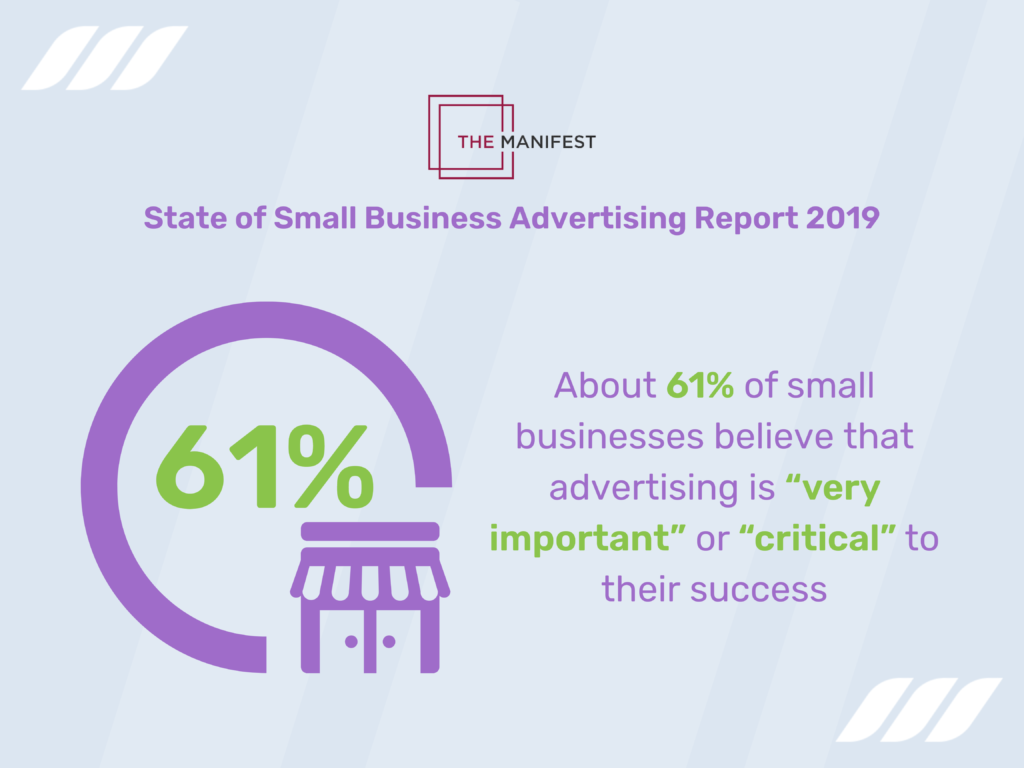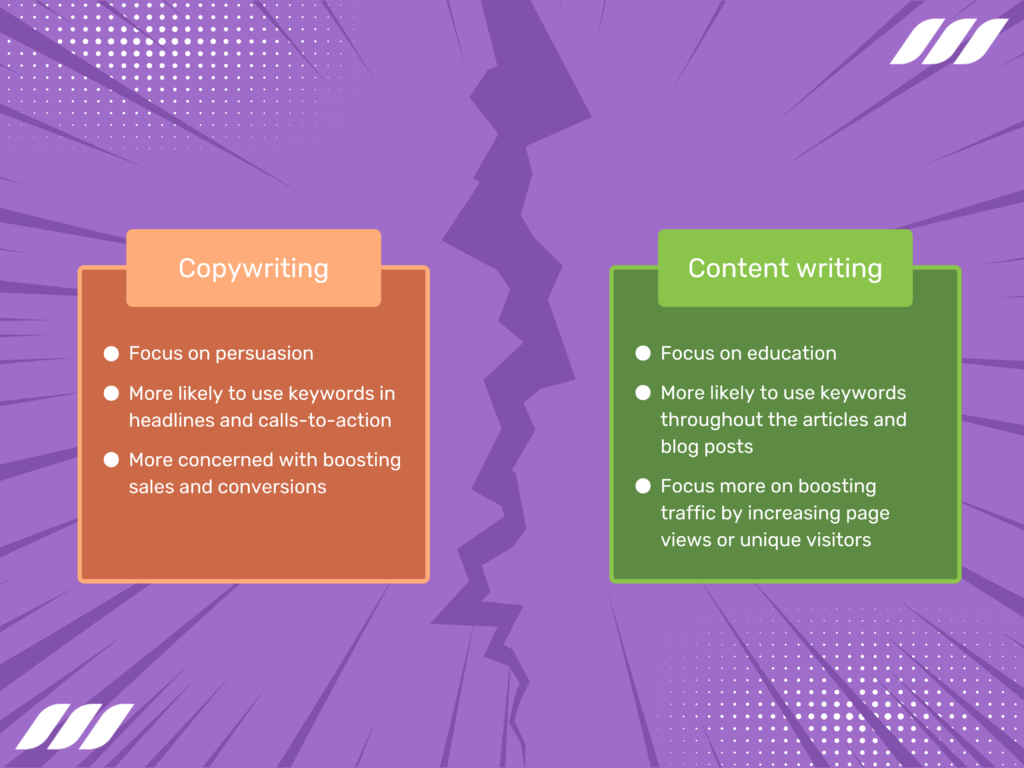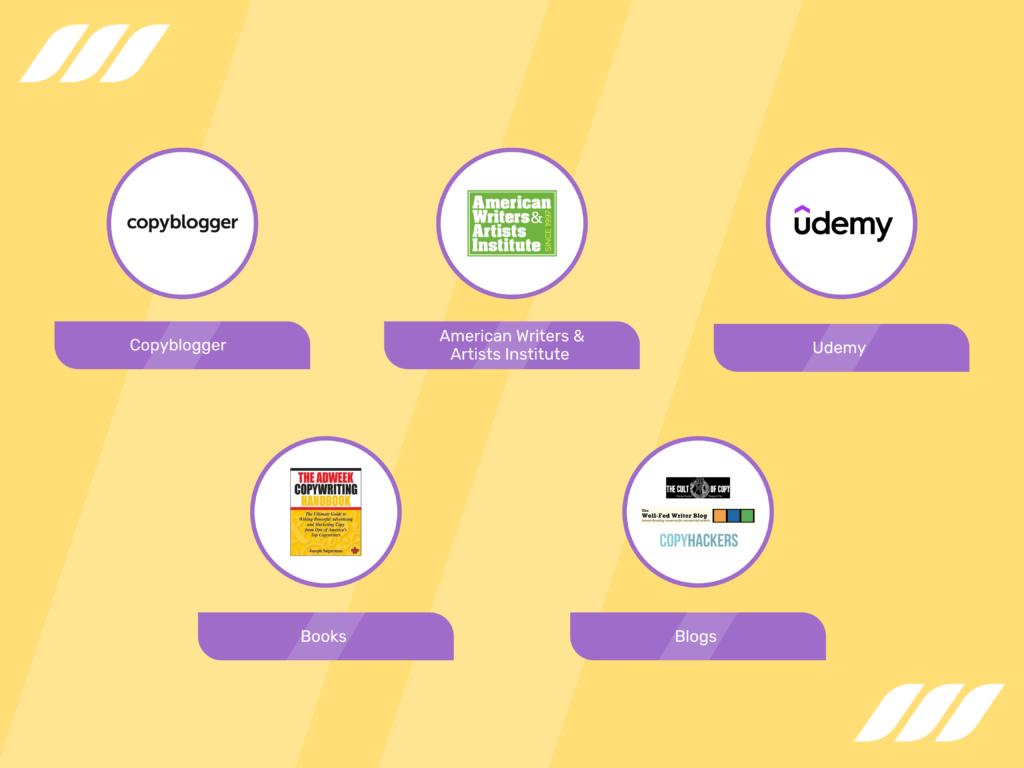|
Getting your Trinity Audio player ready...
|
The world of content marketing is growing at a rapid pace. It doesn’t matter if you’re working in a big agency or as a freelancer – the demand for copywriters will only continue to grow.
As a copywriter, you’ll help businesses sell their products and services by creating website copy, ads, and marketing materials that communicate the value of their products or services in an engaging and persuasive way. Copywriters come up with the perfect combination of words to sell a product.
In a nutshell, copywriting is the act of writing persuasive or informative text for marketing or advertising. It’s a skill you can learn and master with practice and is a great way to start your career in the marketing or advertising industry.
But remember that not everyone can write persuasive and convertible copy; it takes a great deal of dedication and practice before you start churning out words with convincing power.
Today, we’ll discuss everything you need to know about copywriting and share the best tips to help get your foot in the door. By the end of this detailed guide, you’ll have a good understanding of the fundamentals of copywriting, and your remaining journey will feel easier.
What Is Copywriting?
So, what is copywriting, you ask? Copywriting is the art of creating persuasive content that encourages people to take the desired action. That could be anything from purchasing a product to signing up for a newsletter or downloading a white paper.
No matter your niche or industry, all great copies have one thing in common: they speak to the needs and wants of their target audience. Good copywriters condense complex ideas into a few simple sentences and produce words that resonate with readers.
Copywriting is also the process of creating marketing materials like website content, ad copy, email newsletters, and more. Since copywriting aims to persuade the reader to take the desired action, copywriters mold the format and words accordingly.
To be effective, a copy must be well-written and carefully tailored to cater to the needs of its target audience. It should be free of grammar and spelling errors and evoke an emotional response that compels the reader to take action.

What Is a Copywriter?
A copywriter is a wordsmith responsible for creating high-quality content that meets the specific needs of a business and its target audience. Whether it’s about launching a new product or service, driving website traffic, or simply looking for creative ways to promote your business, copywriters can help you achieve your goals with great content.
As a copywriter, your job is to create interesting and engaging content that effectively communicates your message and sells a product. With only a few words, you need to inspire people with just enough information to convince them that they should buy the product.
In most cases, copywriters are brought on board to help with marketing and advertising collateral, such as website content, brochures, taglines, product descriptions, and email campaigns.
Copywriters dig deep to understand the needs, problems, pain points, and interests of the target audience so they can craft messages that resonate. They’re also well-versed in SEO best practices to ensure the copy they write ranks higher in search engines and drives targeted traffic.
And, of course, great copywriters have a knack for writing engaging, persuasive, and easy-to-read copy. The best copywriters make it look effortless; behind the scenes, they’re constantly tweaking and testing their work to ensure it’s performing as well as it possibly can.
Plus, copywriters must understand the product they want to promote and the target customers for the product. They rely on research to create persuasive content that speaks directly to the needs of their audience. A good copywriter can also capture their client’s or company’s voice and infuse it into their writing.
And lastly, copywriters must also be strategic thinkers. A large part of their job is developing creative ways to reach their target audience and get them interested in what they have to say. This requires a deep understanding of both marketing and human psychology.

Who Uses Copywriters?
So, who uses a copywriter? And why? Let’s find out!
1. Advertising Businesses
Advertising copywriters create compelling ad campaigns that grab attention and drive results. A good advertising copy will increase brand awareness, generate leads, and boost sales.
2. Digital Marketing Companies
Today, most businesses have a digital presence, which means they need someone to manage their online content. From website copy to social media posts, a copywriter will help businesses create and distribute content that meets their goals.
3. Public Relations Businesses
PR firms often hire copywriters to help them craft press releases, pitch letters, and other communication materials. A well-written press release can generate positive media coverage for a business, leading to more customers and sales.
4. Web Design Companies
A website is often the first method a potential customer uses to interact with a business. As such, most web design companies hire copywriters to create website content that is clear, concise, and easy to read.
5. Product Design Businesses
Copywriters can also be helpful in the product design process. A good copywriter will understand the target market and what needs to be said to convince them to buy a product.
6. Corporate Firms
Many corporate firms hire in-house copywriters to help with internal communications, such as employee newsletters or intranet articles. Corporate copywriting is usually more technical in nature and requires a deep understanding of the company’s products or services.
7. Charities and Nonprofits
Nonprofit organizations rely on donations to stay operational. A good charity copywriter can craft donation letters and grant proposals that pull on the heartstrings and encourage people and organizations to donate.
8. SaaS Companies
SaaS companies typically use copywriters to create marketing collateral, such as website copy or emails, and develop user manuals or other technical documentation. Discover the best SAAS management platforms on the market.
9. Retail Brands
Retail brands often hire freelance copywriters to help with seasonal campaigns or special promotions. A retail brand might also use a copywriter to create product descriptions for its website or catalogs.
B2B SaaS copywriting is surely a vital part of any business, big or small. No matter what industry you’re in, there’s a good chance that a B2B copywriter can help you achieve your business goals.
Why Is Copywriting Important?


As a marketing professional, you probably have many tasks on your plate. From social media to website design, there are so many things that you need to do to create a successful marketing campaign. However, what most marketers neglect is the importance of copywriting.
While it may seem like something small and insignificant, how you communicate your message can make or break your entire marketing strategy. A good copy can make your product stand out and help your company succeed in ways that other marketing efforts cannot achieve alone.
Here’re some reasons why copywriting is important:
Copywriting is the Foundation of Marketing and Advertising
As we mentioned before, without an effective copy, you will not be able to sell your product or service — no matter how great it might be. That is why copywriting forms the foundation of marketing and advertising; without it, those industries would not exist. Many people in the marketing and advertising industries began their careers as copywriters!
Copywriting Helps You Tell Your Brand’s Story
A good piece of copy can do more than just sell a product or service; it can also help tell your brand’s story. In today’s competitive marketplace, telling your brand’s story is more important than ever. With so many businesses selling similar products or services, customers often look for something different — something that resonates with them on a personal level.
Copywriting Can Help You Reach Your Target Audience
An experienced copywriter knows how to use language that resonates with a specific audience and speaks to their needs, wants, and desires. They also know how to use keywords and other search engine optimization (SEO) techniques to ensure that their content reaches people interested in what they have to say.
From helping you tell your brand’s story to reach specific target audiences, SEO copywriting plays a crucial role in the success of any marketing or advertising campaign.
Is Copywriting a Growing Industry?
In a rapidly digitizing world, the power of well-written words has never been more important. A good copywriter can take technical information and make it digestible for the average person.
While there are many factors at play in the growth of copywriting as an industry, the three driving forces are: the ever-increasing need for effective marketing, the popularity of content marketing, and the scope for career development.
1. Need For Effective Marketing


A professional copywriter understands how to craft a persuasive message that speaks to the needs of the target customer. Interestingly, businesses are becoming more aware of the importance of effective marketing.
According to The Manifest’s 2019 State of Small Business Advertising report, 43% of small businesses increased their advertising spending in 2018, while only 19% decreased their budget. What’s more? About 61% of small businesses believe that advertising is “very important” or “critical” to their success.
These stats show that companies are willing to invest in quality advertising, which means there’s good reason to believe that copywriting will continue to grow as an industry.
2. Popularity of Content Marketing
Content marketing is a form of marketing that focuses on creating and distributing valuable content to attract and retain customers.
Unlike other forms of marketing, such as traditional advertising, content marketing does not explicitly promote a brand or product. Instead, it provides consumers with information that they will find helpful, thereby building trust and credibility.
Copywriting plays a central role in content marketing because, without well-written content, businesses will struggle to deliver their message effectively. That’s why many companies are now investing more heavily in content marketing than ever before.
3. Scope for Career Development
Unlike many other industries, there are few barriers to becoming a professional copywriter. All you need is some decent writing samples and a strong understanding of grammar.
That said, if you want to stand out from the crowd, you’ll need more than just basic writing skills; you’ll need creativity, charisma, and above all else, passion. But if you’ve got what it takes, then there’s no limit to what you can achieve as a professional writer.
What’s the Difference Between Copywriting and Content Writing?


In the simplest terms, copywriting is all about persuasion, while content writing focuses on creating educational and helpful material.
Copywriters create headlines and ad copy that will convince the reader to take some sort of action, whether it’s making a purchase, signing up for a newsletter, or downloading a white paper.
Content writers, on the other hand, write articles, blog posts, and social media posts to help the reader learn more about a particular topic. Copywriters also need to educate their readers to some extent, or they can’t persuade them to take action.
Similarly, content writers need to be able to convince their readers to read their articles and blog posts, or they won’t achieve their goals. In other words, there’s considerable overlap between the two disciplines.
So what are some of the key differences between the two? Let’s take a closer look:
Emphasis on Persuasion vs. Education
As we mentioned above, copywriters focus on persuasion, while content writers focus on education. But, there’s considerable overlap between the two disciplines. So while persuasion may be the primary focus for copywriters and education may be the primary focus for content writers, both groups need to have some ability to persuade and educate.
Use of Keywords
When it comes to SEO (search engine optimization), keywords are critical — no matter if you’re a copywriter or content writer. That said, how you use keywords can differ slightly between the two groups.
For instance, copywriters may be more likely to use keywords in headlines and calls-to-action to make their copies more visible on search engine results pages (SERPs).
On the other hand, content writers may be more likely to use keywords throughout their articles and blog posts to ensure that their articles rank highly in SERPs.
Focus on Sales vs. Readership/Traffic
Another difference between copywriting and content writing is what metric you’re trying to improve. For instance, copywriters may be more concerned with boosting sales and conversions, such as getting people who see their ads to take some sort of action.
Meanwhile, content writers focus more on boosting traffic by increasing page views or unique visitors, such as getting people to read their articles.
Types of Copywriting
Copywriting is how you get your message across to your audience in a way that is both meaningful and compelling. But what are the different types of copywriting? And which one is right for your project?
Let’s take a closer look at the most common types of copywriting and their benefits.
1. Advertising Copy
Advertising copy is used to promote a product, service, or brand. It is typically shorter and more to the point than other types of copy, as its goal is to capture the reader’s attention and encourage them to take action.
A good piece of advertising copy should be clear, concise, and geared towards the target audience, considering their needs and interests.
For example, an advertising copy for a new car might highlight the vehicle’s fuel efficiency. In contrast, a copy for a vacation resort might focus on the beautiful location and amenities.
By understanding how to write compelling advertising copy, you can create material that will help to boost sales and build customer loyalty.
2. Sales Letters


A sales letter is designed to persuade the reader to take a particular action, such as making a purchase. You can use sales letters in various marketing and advertising campaigns. Also, they are often used in direct mailers and email marketing messages.
When writing a sales letter, it is crucial to focus on the benefits of the product or service you are selling and ensure the letter is clear and easy to read. It is also essential to include a call to action so that the reader knows what they need to do next.
For example, a sales letter for a new car might include information about the car’s features and benefits, as well as an offer for a test drive. The letter’s goal would be to convince the reader that the car is worth purchasing.
3. Web Content
Web content often refers to the text present on a website. This includes everything from the headlines and body copy to the ALT text on images and the meta descriptions of blog posts.
While the primary goal of web content is to communicate information to website visitors, we can also use it to persuade readers to take action. For example, an effective call-to-action (CTA) can encourage website visitors to sign up for a newsletter or subscribe to a service.
4. Brochures and Catalogs
Brochures and catalogs provide an overview of the products or services of a company. They typically include detailed descriptions and images to help consumers make an informed purchase decision.
Brochures and catalogs can be effective marketing tools, as they can reach a broad audience with little effort. For example, a company could distribute brochures at trade shows or mail them directly to consumers.
Additionally, brochures and catalogs can be an important part of a salesperson’s arsenal, as we can use them to introduce potential customers to a company’s offerings.
5. Email Marketing
Email marketing is a form of direct marketing that uses electronic mail to communicate with leads and customers.
One example of an effective email marketing campaign is a welcome email sent to new subscribers as soon as they sign up for your list. This type of email typically contains a personalized message from the sender and links to popular content on the website.
Welcome emails help businesses build rapport with new subscribers and encourage them to explore your website further.
Related article: Best Email Marketing Automation Tools
6. SEO Copywriting
SEO copywriting is a type of writing designed to help website pages rank higher in search engine results pages (SERPs). While conventional copywriting focuses on crafting persuasive and interesting content, SEO copywriting also considers keywords and other optimization techniques.
When done correctly, SEO copywriting can help your website attract more organic traffic and improve your overall visibility online.
Here’s an example of how you can use SEO copywriting to improve your website’s ranking for the keyword “dog food.” Let’s say you own a pet store and want to blog about choosing the right dog food. You could start your blog post with a general introduction to the topic and then segue into discussing the different types of dog food available.
As you discuss each type of food, mention the keyword “dog food” several times. In addition, you could include a section on how to choose the best dog food for pets and end with a brief summary of the pros and cons of each type of food.
Following these tips will help you use SEO copywriting to improve your website’s ranking for relevant keywords and attract more organic traffic.
Where to Learn Copywriting?
Whether you’re starting your own business or looking to add copywriting to your existing skillset, these are the five best places to learn copywriting.


1. Copyblogger
Copyblogger is one of the most popular websites for copywriters. It’s packed with articles, courses, and resources on everything, from SEO to email marketing.
One of the best things about Copyblogger is that it offers something for everyone, regardless of their skill level. Whether a complete beginner or a seasoned pro, you’ll find something valuable on Copyblogger.
2. American Writers & Artists Institute
The American Writers & Artists Institute (AWAI) is a well-known resource for copywriters of all levels. They offer both online and offline courses, as well as helpful resources like templates and swipe files.
AWAI also has a job board where you can find copywriting gigs, making it a great resource if you want to get started in the industry.
3. Udemy
Udemy is a great place to find affordable online courses on just about any topic, and copywriting is no exception. While there are plenty of low-quality courses on Udemy, some gems are worth their weight in gold.
When choosing a course on Udemy, read the reviews carefully before enrolling. That way, you can be sure you’re getting your money’s worth and learn copywriting for social media.
4. Books
There are plenty of great books on copywriting, ranging from beginner guides to advanced strategy manuals. A few of our favorites include “The Adweek Copywriting Handbook” by Joseph Sugarman and “The Definitive Guide to Copywriting” by Andy Maslen.
If you’re looking for a more comprehensive education, consider checking out AWAI’s “Accelerated Program for Six-Figure Copywriting.”
5. Blogs
In addition to Copyblogger, plenty of other great blogs offer helpful tips and advice for copywriters at all levels. A few of our favorites include Cult of Copy, Copy Hackers, John Carlton, and The Well-Fed Writer.
These blogs offer valuable insights on everything from effective headline writing to crafting the perfect call to action. Make sure to add them to your RSS feed so you never miss an article!
13 Tips to Become a Copywriter
If you’re interested in becoming a copywriter, here are some tips to help you get started:
1. Find Your Niche
Today,businesses are facing an intense struggle to cut through all the noise and find their audience. In an oversaturated marketing landscape where consumers are more selective about what they spend time on, brands need to get creative and find ways to stand out.
To stand out, you must first find your niche. As any professional copywriter will tell you, knowing who you’re talking to and what makes you different from the rest is essential. It’s not enough even to just be different – you need a unique selling proposition that no one else can offer.
What kind of writing do you want to do? Do you want to write a web copy? Ad copy? Brochures? Once you’ve decided what kind of writing you want to do, you can start honing your skills and building your portfolio.
2. Practice
Let’s face it — copywriting isn’t easy for anyone. We all struggle with coming up with the perfect words for our ads, brochures, websites, or even social media posts sometimes. The key to getting better is continuous practice.
Remember, practice makes a man perfect! This is definitely true for any other type of writing. It doesn’t matter what you write about, just so long as you’re writing and doing it daily.
The more you write, the better you’ll be at putting your thoughts into words. And who knows, maybe one of those daily writings will turn into your next big project!
Even if you’re a natural writer, copywriting requires time spent honing your skills. It helps to learn from others who are more experienced than you, but there is no substitute for hours of practice until it feels easy or second nature.
3. Read, Read, And Read Some More
Reading helps improve your writing skills by improving your grammar and writing style, besides exposing you to new and creative ways of thinking. So make sure to set aside time each day to crack open a book (or two!).
Reading as much as possible will help you understand the principles of good writing, explore excellent copywriting examples, and develop your own voice as a writer. But reading alone isn’t the key to unlocking its secrets. Your ability to read critically and analyze what you read is what unlocks that potential for transformation.
4. Listen to Podcasts and Webinars
Podcasts and webinars are a great way to improve your copywriting skills. Listening to professional and experienced copywriters about their experiences, struggles, and advice helps us learn how to become better writers.
Luckily, many established writers produce podcasts and webinars regularly, offering tips and advice on everything from improving your writing skills to landing clients.
5. Attend Workshops and Conferences
Workshops and conferences are great networking opportunities that can help you learn more about copywriting. They also allow you to meet other writers and build relationships with potential clients.
6. Get Involved With Professional Organizations
Professional organizations offer many resources to help you in your copywriting career. These organizations can help connect you with other writers, give you access to industry news and resources, and provide professional development opportunities.




7. Work With a Mentor
Mentors can help guide you in your career as a writer by sharing their knowledge and experience with you. If you don’t have any mentors in your life right now, try reaching out to one of your favorite authors or an experienced writer friend for advice.
Working with a mentor is helpful in several ways: You get to know another person who is an expert in the field, you get insights into your strengths and weaknesses, and most importantly, you grow personally as well as professionally.
A mentor can help you see things from a different perspective, give constructive feedback on your work, and help you develop new skills. It’s also much easier to get this type of support if you know someone who fits the bill.
8. Start Freelancing
Once you’ve built up your skills and experience, it’s time to start freelancing!
Sending out pitches, guest blogging, and creating strong samples are great ways to get started as a freelance copywriter.
9. Build a Strong Portfolio
A strong portfolio is essential for any freelance writer. Make sure to showcase your best pieces in your online portfolio so potential clients can see your work. Here are a few tips for building a good portfolio:
- Only include your best work in your portfolio. This may seem obvious, but it’s worth repeating. Your portfolio should showcase your very best writing, so choose your pieces carefully.
- Make your examples more accessible. Potential clients will want to be able to quickly and easily find the information they’re looking for. That means your portfolio should be accessible, well organized, and easy to navigate.
- Keep it up to date. One of the worst things you can do is let your portfolio get out of date. Make sure to regularly add new writing samples so potential clients can see your latest work.
10. Network, Network, Network!
Networking is an integral part of any freelance career, but it’s even more crucial for writers because it’s often how we find work. Attend industry events, connect with other writers online, and never pass up an opportunity to chat with someone new about writing!
11. Hone Your Skills With Online Courses


If you want to become a copywriter, there are a few skills you need to hone. And one of the best ways to do that is by taking online courses. Here’s why:
- Learn at your own pace: Online courses allow you to learn to become a copywriter or blogger at your own pace. That means you can take as much or as little time as you need to master the material. And if you need to review something, you can always go back and watch the lectures or re-read the materials.
- Access to expert knowledge: When you take an online course, you have access to expert knowledge. Copywriting is a complex skill, and it takes years of practice to perfect. But when you take an online course, you can learn from someone already an expert in the field. And that can give you a huge leg up when mastering the craft.
- Get feedback: One of the best things about taking an online course is getting feedback from your instructor. That means if you’re struggling with something, you can get help right away. And if you want extra credit, you can always ask your instructor for additional assignments.
12. Stay Up-to-Date on Industry Trends
Keeping up with industry trends is important for any profession, but it’s especially important for writers because our job is all about connecting with people and understanding what they want. By understanding the latest trends, we can create content that resonates with our audience and help our clients achieve their goals.
13. Never Stop Learning!
The world of copywriting is always changing, so there’s always something new to learn! Whether it’s taking an online course or simply reading blogs and articles written by experienced writers, make sure to dedicate some time each day or week towards learning something new about copywriting — you never know when that new piece of information will come in handy!




Conclusion
Copywriting involves creating written content that promotes or sells something. It usually refers to marketing materials like ads and brochures, but it could also be website copy, product descriptions, or pretty much anything else that helps get your message out there through words instead of images alone.
Copywriting is a skill anyone can master with the right amount of practice and motivation. While it may seem daunting initially, remember that everyone has to start somewhere. The most important thing is to get started and to keep learning.
Luckily, there are plenty of ways to beef up your copywriting skills from home. Even better, most of them won’t cost you a dime! The internet is home to some of the best copywriting resources to help you improve your skills, so be sure to take advantage of it!

![How to Write a Price Increase Letter [Tips, Examples, and Free Template]](https://dripify.io/wp-content/uploads/2021/12/27.png)
![How to Write an Effective Collaboration Email [+Templates]](https://dripify.io/wp-content/uploads/2023/05/13.png)



